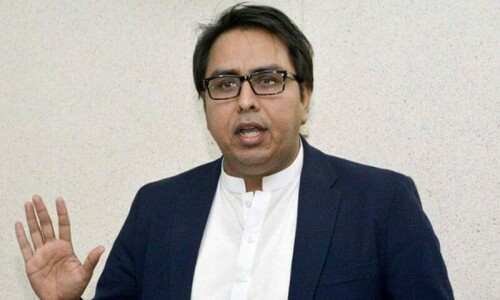LAHORE: For Fahmida (not real name), 48, the pain is unbearable and yet she is unable to go see the doctor, ever since the lockdown began. By the time Fahmida was diagnosed with breast cancer it had reached stage 3. Since then her health has been deteriorating – she has lost weight drastically, and for now since the past three months has no idea where the cancer stands. The only source of information is her doctor who she must reach out on text messages, and who often takes days in replying.
Since the lockdown began, many of the patients other than those diagnosed with Covid-19, have been pushed downwards in terms of priority, as OPDs have closed and doctors are bearing the brunt of treating more patients than is the capacity of the hospital.
With cancer patients the case is slightly different though. These are patients who must be monitored and tested on a timely basis, while also being extremely high risk in contracting Covid-19.Yet it seems a majority of them has not been able to receive their required treatment.
Sonia Qaiser from Pink Ribbon says many patients have had to forgo their treatment and checkups and have been suffering for that reason.
“Many patients are those who are undergoing chemotherapy for example,” says Qaiser.
“For such patients, they must not even skip one session otherwise they must start their chemo treatment all over again.”
This is a very stressful situation for patients because chemo is one of the most expensive treatments and for several patients it is not always accessible either.
Yasmeen was one of those patients who travelled from Karachi to Islamabad in March but was stuck there after the lockdown began. She had to get her seventh chemo injection in Karachi but could not do so. With a little help from friends who knew doctors, she finally received her chemo in Islamabad, otherwise, she would have had to begin the entire treatment all over again – at least 100,000 for each injection.
“Currently, we know there are no OPDs and hospitals taking such patients in, not even for tests,” says Qaiser.
“Apart from this, cancer patients are one of the most vulnerable groups nowadays since their immunity is already low, and so they must also take immense care of themselves during this crisis. These factors are making it very difficult to treat patients.”
According to Pink Ribbon Pakistan, at least 40,000 women die of breast cancer every year, and on top of this, Covid-19 has been lethal for breast cancer patients the most as “20% of corona deaths are that of cancer patients”.
What about the cancer specific hospitals that are already running?
One of Lahore’s renowned breast surgeons, Dr Huma Majeed feels that patients with this disease must be given a priority.
“I don’t seem to understand why we needed to turn a cancer hospital (Shaukat Khanum) into a corona centre,” she asks. “It was doing some tremendous work for cancer patients – could we not have used any other building for this purpose?” She says now the work has suddenly stopped because of this.
“Our healthcare policies are certainly strange in this regard,” she says.
“Inmol hospital is still continuing to do work based on a lot of rotations, but a lot of the other hospitals have stopped work. Now we can’t get tests anywhere, and some important medicines are not available. Most people (doctors and hospitals) are working on individual level only, not according to government policy.” Bone scans, biopsies, even checking of vitals - essential for a patient - is not happening.
For cancer patients, in general, the risk is high, she says, and access to health care seems next to impossible.
Dr Huma says while the incidence of the disease (breast cancer) is the same and Covid will not change anything, there is a huge issue of mobility.
“Most patients are unable to come or be brought by their family, because for them it’s not affordable, especially since public transport has been stopped.”
Many of them do not have access to bigger cities.
“A couple of my patients come from places like Raiwind which are now sealed -- one of them even needed a surgery but couldn’t come. Obviously resources in a pandemic are lowered, but we must prioritize some of the other chronic illnesses otherwise there will be deaths there too.”
As far as contracting Covid is concerned, Dr Huma says the patients who have had chemotherapy are highly vulnerable. But if such a patient does get tested and comes out positive where will she go?
“A lot of patients are just scared of testing, because they think they will be taken away – and this has to change. In any case hospitals simply must be given enough PPEs, and protection, especially in these conditions,” she says.
“The cancer patient being high risk can either pass on the disease or contract it.”
She says OPDs should be open and serious cases be prioritised,” she says.
“Government must have special clinics for cancer patients, and for patients at home, they must keep in touch with their caregiver on phone or video call, even if not physically.”
Published in Dawn, April 29th, 2020













































Dear visitor, the comments section is undergoing an overhaul and will return soon.